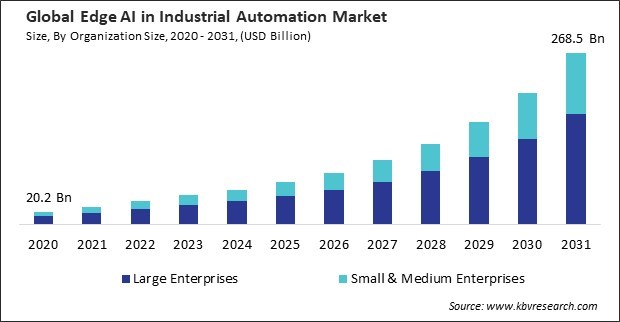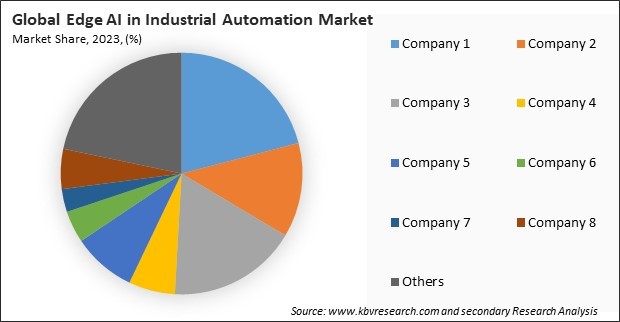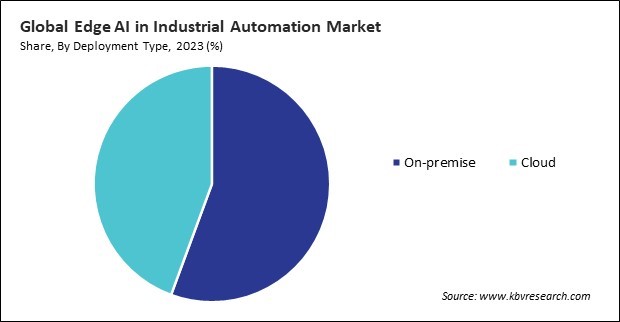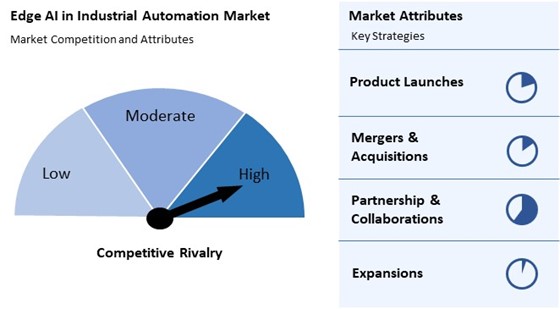“Global Edge AI in Industrial Automation Market to reach a market value of USD 268.5 Billion by 2031 growing at a CAGR of 25.4%”
The Global Edge AI in Industrial Automation Market size is expected to reach $268.5 billion by 2031, rising at a market growth of 25.4% CAGR during the forecast period.
As industries strive for higher operational efficiency, reduced downtime, and optimized production processes, AI software solutions are vital in analyzing data, detecting anomalies, and generating actionable insights. The growth of this segment is further supported by the increasing adoption of sophisticated algorithms and machine learning models tailored to address specific industrial requirements. These software solutions allow companies to maximize the potential of their hardware investments by leveraging AI for improved decision-making, automation, and overall productivity. Thus, the software segment procured 29% revenue share in the edge AI in industrial automation market in 2023.

The major strategies followed by the market participants are Partnerships as the key developmental strategy to keep pace with the changing demands of end users. For instance, In September, 2024, Oracle has formed a partnership with Anduril Industries to integrate Anduril’s Lattice command and control platform with Oracle Cloud Infrastructure. This alliance is set to strengthen global defense capabilities, providing secure and scalable solutions for mission-critical operations from the datacenter to the tactical edge. Additionally, In September, 2024, Gorilla Technology Group Inc. has partnered with Lanner Electronics to establish a joint venture focused on manufacturing next-generation AI-enabled security convergence appliances in Thailand. This collaboration is designed to address global cybersecurity demands through a diverse product lineup, improving manufacturing efficiency, quality, and scalability.
Based on the Analysis presented in the KBV Cardinal matrix; Microsoft Corporation and Google LLC are the forerunners in the Edge AI in Industrial Automation Market. In March, 2024, Microsoft Corporation and Hitachi came into partnership to launch a strategic multi-billion-dollar partnership to enhance Lumada solutions with generative AI, improve productivity for 270,000 employees, and train over 50,000 professionals. The collaboration aims to drive innovation in energy, mobility, and sustainability efforts. Companies such as Amazon Web Services, Inc., NVIDIA Corporation and IBM Corporation are some of the key innovators in Edge AI in Industrial Automation Market.

By facilitating real-time decision-making and processing data locally, edge AI guarantees that production continuity is maintained by resolving such issues when they arise. This improves operational efficiency and enhances industrial automation systems' overall reliability and safety, making edge AI a vital technology for modern manufacturing environments. Hence, the benefits of edge AI in improved efficiency and reduced latency further expedite its demand, thereby supporting the market's growth.
Additionally, this is especially beneficial in hazardous areas where human safety is an issue since it enables robots to perform equipment inspections or material transportation without posing a threat to human laborers because it eliminates the need for human workers to be present. Thus, as the use of robots increases in industries, the demand for edge AI will also increase owing to its advantages. This, in turn, will drive the expansion of the market.
The absence of a common framework or standard for interoperability means that integrating these different pieces of equipment with an overarching AI system requires extensive customization. Each piece of machinery may need a unique solution to connect with the edge AI system, which can be cumbersome and add further complexity to the integration process. Thus, these issues make implementation of edge AI solutions at scale challenging.

The leading players in the market are competing with diverse innovative offerings to remain competitive in the market. The above illustration shows the percentage of revenue shared by some of the leading companies in the market. The leading players of the market are adopting various strategies in order to cater demand coming from the different industries. The key developmental strategies in the market are Partnerships, Collaborations & Agreements.
Based on component, the market is segmented into hardware, software, and services. The hardware segment garnered 56% revenue share in the market in 2023. This expansion was primarily the result of the increasing demand for sophisticated periphery devices that can process AI algorithms locally, thereby reducing latency and facilitating real-time decision-making, which is essential in industrial settings.
On the basis of solutions, the market is classified into predictive maintenance, quality control & inspection, process optimization, anomaly detection, energy efficiency management, and others. The predictive maintenance segment witnessed 28% revenue share in the market in 2023. Predictive maintenance leverages real-time data processing and machine learning algorithms at the edge to continuously monitor the health of equipment and predict potential issues before they escalate into costly failures.
By end-use, the market is divided into manufacturing, energy & utilities, oil & gas, automotive, logistics & transportation, healthcare, and others. The energy & utilities segment garnered 19% revenue share in the market in 2023. Edge AI solutions are crucial in monitoring power generation equipment, analyzing energy consumption patterns, and predicting maintenance needs.
Based on deployment type, the edge AI in industrial automation market is bifurcated into on-premise and cloud. The cloud segment acquired 44% revenue share in the edge AI in industrial automation market in 2023. Cloud-based solutions allow companies to access powerful computational resources without significant capital investment in hardware.

The hardware segment is divided into edge devices, sensors, and gateways. The sensors segment witnessed 28% revenue share in the edge AI in industrial automation market in 2023. The expanding segment reflects the increasing need for accurate and reliable data collection across industrial environments. Sensors are fundamental in capturing data related to various parameters, such as temperature, pressure, vibration, and quality metrics, which serve as inputs for AI-driven automation processes.
The software segment is further fragmented into edge platforms, AI algorithms, and machine learning models. The AI algorithms segment procured 30% revenue share in the edge AI in industrial automation market in 2023. AI algorithms, tailored to specific industrial applications, are crucial for processing data collected by edge devices and sensors, enabling real-time insights and decision-making.
The services segment is further segmented into deployment, integration, and consulting. The integration segment recorded 35% revenue share in the market in 2023. Many industrial facilities operate with legacy equipment not initially designed for AI compatibility, making the integration process complex. Specialized integration services help bridge the gap between new AI solutions and traditional systems, ensuring they work cohesively.
On the basis of organization type, the market is divided into large enterprises and small & medium enterprises. The large enterprises segment recorded 68% revenue share in the market in 2023. Large enterprises often have the financial capacity to implement cutting-edge AI solutions on a broad scale, which helps them achieve greater operational efficiency, reduce downtime, and enhance production quality.
Free Valuable Insights: Global Edge AI in Industrial Automation Market size to reach USD 268.5 Billion by 2031

The Edge AI in the Industrial Automation market is highly competitive, characterized by rapid technological advancements and a focus on innovation. Key attributes include real-time processing, enhanced data privacy and security, and scalability across various devices. Integration with IoT is essential for smarter manufacturing and predictive maintenance. Companies emphasize partnerships and competitive pricing to attract a diverse customer base. The growing demand for cost-effective automation and customized solutions drives market growth and technological advancements within the industry.
Region-wise, the market is analyzed across North America, Europe, Asia Pacific, and LAMEA. The Europe segment procured 25% revenue share in the market in 2023. European countries have been at the forefront of implementing Industry 4.0 technologies to modernize their industrial processes, focusing on optimizing energy consumption and reducing carbon emissions.
| Report Attribute | Details |
|---|---|
| Market size value in 2023 | USD 46.2 Billion |
| Market size forecast in 2031 | USD 268.5 Billion |
| Base Year | 2023 |
| Historical Period | 2020 to 2022 |
| Forecast Period | 2024 to 2031 |
| Revenue Growth Rate | CAGR of 25.4% from 2024 to 2031 |
| Number of Pages | 506 |
| Number of Tables | 854 |
| Report coverage | Market Trends, Revenue Estimation and Forecast, Segmentation Analysis, Regional and Country Breakdown, Competitive Landscape, Market Share Analysis, Porter’s 5 Forces Analysis, Company Profiling, Companies Strategic Developments, SWOT Analysis, Winning Imperatives |
| Segments covered | Component, Deployment Type, Organization Size, Solutions, End-Use, Region |
| Country scope |
|
| Companies Included | Microsoft Corporation, IBM Corporation, Amazon Web Services, Inc. (Amazon.com, Inc.), NVIDIA Corporation, Google LLC (Alphabet Inc.), Synaptics Incorporated, Nutanix, Inc., Adlink Technology, Inc., Gorilla Technology Group Inc. and Oracle Corporation |
By Organization Size
By Deployment Type
By Component
By End-Use
By Solutions
By Geography
This Market size is expected to reach $268.5 billion by 2031.
Rising demand for improved efficiency and reduced latency are driving the Market in coming years, however, High initial costs and ROI uncertainty restraints the growth of the Market.
Microsoft Corporation, IBM Corporation, Amazon Web Services, Inc. (Amazon.com, Inc.), NVIDIA Corporation, Google LLC (Alphabet Inc.), Synaptics Incorporated, Nutanix, Inc., Adlink Technology, Inc., Gorilla Technology Group Inc. and Oracle Corporation
The expected CAGR of this Market is 25.4% from 2024 to 2031.
The On-premise segment is leading the Market by Deployment Type in 2023; thereby, achieving a market value of $140.2 billion by 2031.
The Asia Pacific region dominated the Market by Region in 2023, and would continue to be a dominant market till 2031; thereby, achieving a market value of $104.4 billion by 2031.
Our team of dedicated experts can provide you with attractive expansion opportunities for your business.

 Drivers
Drivers
 Restraints
Restraints
 Opportunities
Opportunities
 Challenges
Challenges
